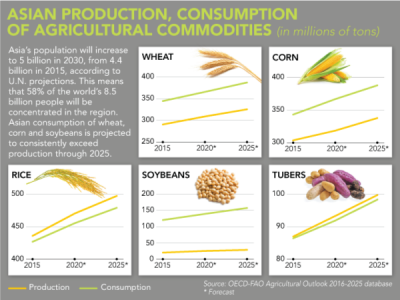Tariffs imposed by the Trump administration collected an estimated $958 million in revenue from selected agricultural inputs from February to October of 2025, according to North Dakota State University's monthly…
Branstad Pick for China: Cautious Optimism From Some in Agricultural Sector
Des Moines Register reporter Jason Noble reported on December 7th that, “Iowa Gov. Terry Branstad will serve as ambassador to China in the administration of President-elect Donald Trump.”
The article noted that, “In a statement, Trump praised Branstad’s long experience and close relationship with Chinese President Xi Jinping.”
The Register article added that, “‘Gov. Branstad obviously as Iowa’s long-serving governor is someone who has considerable public-policy experience but also someone who has a lot of experience and great grasp of trade issues, agriculture issues, has a tremendous understanding of China and Chinese people,’ [Trump spokesman Jason Miller] said.”
I'm honored and humbled to accept this responsibility as Amb to China; Iowa will never be far from my heart #iagov https://t.co/kkyXBYNElZ
— Terry Branstad (@TerryBranstad) December 7, 2016
Barbara Soderlin and Cole Epley reported on the front page of Sunday’s Omaha World-Herald that, “China is a top customer for U.S. agriculture, buying up huge quantities of American soybeans, grains, pork and other ag-related products — $26 billion worth last year.
“So when President-elect Donald Trump rattles the relationship with talk of rewriting trade deals and imposing big tariffs on China, ag leaders can get a little nervous.
“But Midlands ag officials felt more at ease last week after Trump picked Iowa Gov. Terry Branstad to be his ambassador to China.”
The World-Herald article pointed out that, “‘He’s suited for the job, and his relationship with the president of China may make it easier when feathers get ruffled,’ said U.S. Secretary of Agriculture Tom Vilsack, himself a former Iowa governor.
“At any given time, China is the No. 1 or No. 2 customer for U.S. agriculture. And at a time when a surplus of some commodities is keeping prices low for farmers and ranchers, Nebraska ag officials said expanding trade with China is a priority.”
.@cnbc 2 min Video: @usda Vilsack advice to @TerryBranstad -Con't to promote the quality of US ag products in China- https://t.co/R4mH22LTXc
— Farm Policy (@FarmPolicy) December 9, 2016
Soderlin and Epley indicated that, “Still, in Nebraska, which sold an estimated $1.3 billion in total exports to China in 2015, ag and trade leaders said the Branstad pick has them feeling cautiously optimistic;” and the article included this quote from Al Juhnke, executive director of the Nebraska Pork Producers Association:
But now we feel a sense of hopefulness, that there are some people that are being recruited that do understand agriculture, that do understand the importance of trade to us, that can talk to the incoming president.
In addition, Des Moines Register writer Donnelle Eller reported on December 8th that, “Gov. Terry Branstad’s move to an international stage as the nominee for U.S. ambassador to China could open significant opportunities for Iowa and U.S. businesses and farmers, state and national leaders said.”

And the Omaha World-Herald editorial board indicated on December 9th that, “Branstad is in a strong position with both [Xi Jinping and Donald Trump]. He was an early Trump supporter, and the governor’s son helped the Trump campaign finish a surprising second in Iowa. This positions Branstad as a steadying hand, trusted in Washington and Beijing.”
Despite Branstad’s nomination for the China post, concern regarding agricultural trade does persist. As Justin Wingerter noted on December 10th at The Topeka Capital-Journal Online:
“We have our work cut out for us to make the Trump administration understand the value of agriculture trade,” said U.S. Sen. Pat Roberts, a Kansas Republican and chairman of the Senate Agriculture Committee.
As a reminder of the importance of China to agriculture, Financial Times writer Jamie Chisholm reported on December 8th that, “Speculators are net long US soyabean futures and options by 186,000 contracts, the biggest such position since July.
“Investor bullishness stems from expectations that already robust demand is increasing.
“China, the biggest soyabean importer, is forecast to absorb more of the crop as changing eating habits boost consumption.”
Meanwhile, international agricultural competitors aren’t sitting idly by as the U.S. sorts out its trade policies. Wall Street Journal writer Taos Turner reported on December 12th (“Argentina Bets on Farmers to Spur Economic Growth”) that, “Farmers [in Argentina] have already sold $1.2 billion in corn and wheat futures contracts for next season’s crop, up from $285 million a year ago, according to the latest Agroindustry Ministry data.
“Cattlemen say beef production will expand 15% over the next three years. And though soybean production, the most lucrative farm product here, will shrink 3% as farmers shift to other crops, it will remain the world’s third-largest.”
The Journal article added:
“Sixty percent of the world’s population will be middle class by 2030 and they’ll be buying more food,” said Ricardo Negri, an official at Argentina’s Agroindustry Ministry. “We want to be well positioned to export more.”
For additional background on the Trump administration and trade with China see, this FarmPolicyNews update from December 7th: “Trump, Trade and Agriculture.”





